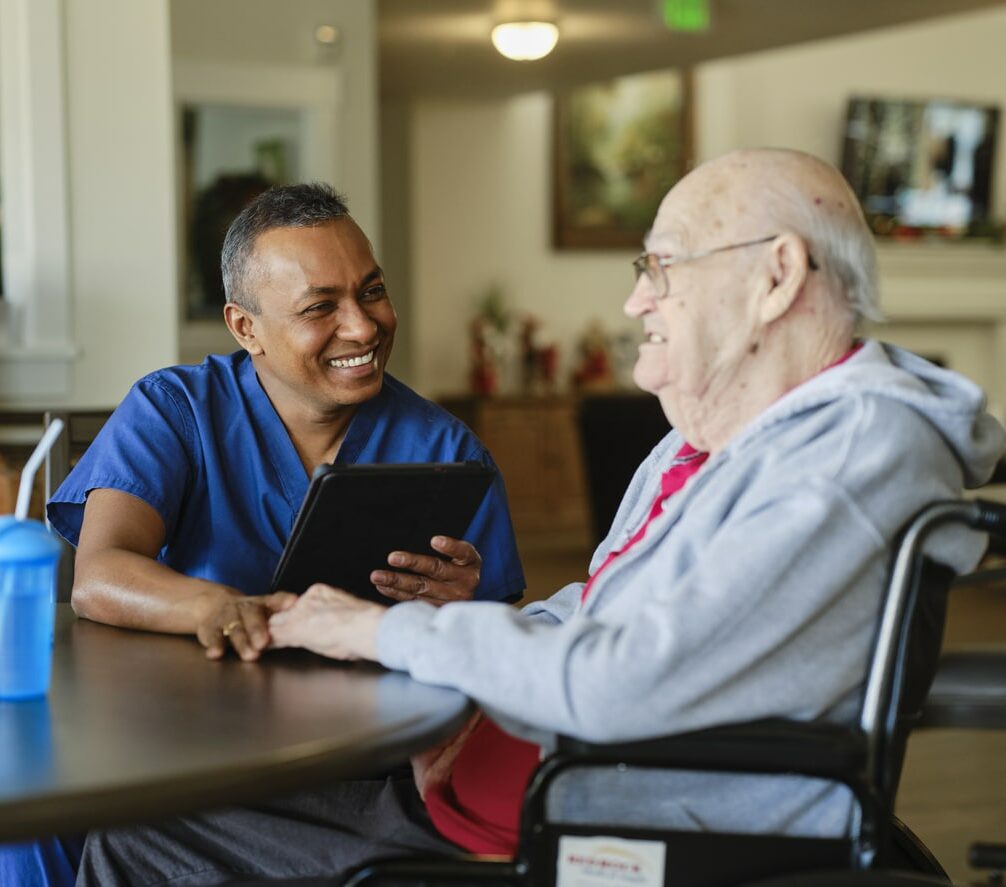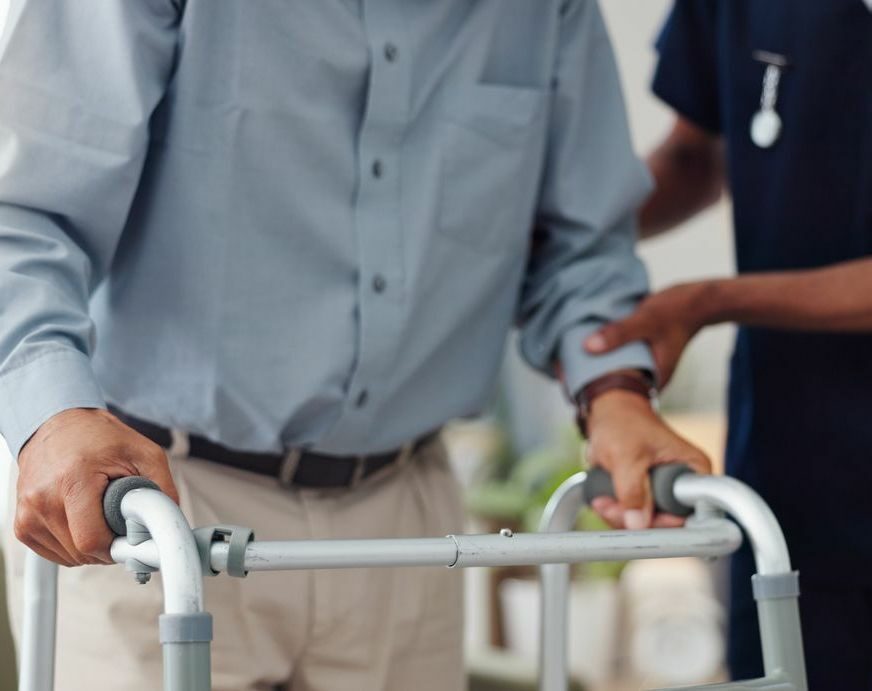Falls in nursing homes can rob residents of their health, confidence, and independence. These are not just accidents. They are often the result of poor training, lack of supervision, or unsafe conditions. Call Legacy Law Firm, today to speak with a nursing home abuse falls lawyer about your free 30-minute consult.
How Fall-Related Injuries Disrupt the Lives of Nursing Home Residents
If your loved one was seriously hurt in a fall, you probably have questions the facility has not answered. Falls are one of the leading causes of injury for nursing home residents, and they are rarely just accidents. Broken hips, head trauma, internal injuries, and mobility loss can happen in an instant, especially when staff fail to supervise or respond to clear risks.
What makes these injuries even harder is the emotional impact they leave behind. Your loved one may stop getting out of bed, stop eating, or become afraid to ask for help. Some residents withdraw completely. They lose the confidence to move freely, and that fear can lead to faster physical decline. When someone is already vulnerable, one fall can change everything about how they live and interact with the world around them.
Federal regulations require nursing homes to take steps to prevent avoidable accidents. Under 42 C.F.R. § 483.25(d), facilities must provide the right level of supervision and use proper safety measures to reduce the risk of injury. If your loved one fell because those systems failed, you have every right to speak up and ask what went wrong.

Why Preventable Falls Are a Form of Nursing Home Abuse
When falls happen again and again, it is often because no one is paying attention to the root cause. In a nursing home, that kind of pattern is not just careless. It can be a form of nursing home abuse. Residents rely on staff to help them move safely, respond when they ask for assistance, and make sure their environment is free from obvious risks.
When those responsibilities are ignored, residents get hurt in ways that could have been prevented. Some of the most common causes of preventable falls include:
- Ignored call buttons
- Wet or slippery floors
- No fall alarms in high-risk rooms
- Not enough staff to assist with transfers
- Residents left to walk alone during shift changes
- Poor lighting in hallways or bathrooms
- Lack of routine toileting plans
- Delayed response to previous falls or complaints
When Nursing Homes Are Liable for Falls
If your loved one was injured in a fall, it is worth asking whether that injury could have been prevented. Nursing homes are required to assess risk, follow care plans, and maintain a safe environment. When they fail to do that, they may be legally responsible for the harm that follows. Your nursing home abuse falls lawyer can help determine who was responsible and what went wrong.
Failure to Supervise or Assess Fall Risk
Some residents are more likely to fall than others. That includes people with balance problems, dementia, medication side effects, or limited mobility. These risks should be clearly documented and used to create care plans that include assistance with walking, transfers, or toileting. When those plans are missing or ignored, serious injuries can happen quickly.
Arkansas law holds care facilities accountable for meeting basic safety standards. Under Ark. Code § 20-10-213, nursing homes must take steps to protect residents from foreseeable harm. That includes assessing fall risk regularly and providing supervision for residents who need it. When staff fail to follow through, the consequences can be life-altering.
Environmental Hazards and Facility Violations
Falls are more likely when the facility itself is not safe. Poor lighting, broken handrails, uneven flooring, and cluttered hallways all increase the risk of injury. If these issues are ignored or never addressed, the facility may be liable for any harm that follows. These hazards are especially dangerous for residents who already struggle with balance or vision.
Care plans often include instructions about using walkers, hand support, or room modifications. If a resident needs grab bars or regular checks but those things are not provided, it shows a failure to follow their plan. Your Arkansas nursing home abuse falls attorney can review those records and see whether the facility failed to meet its responsibilities.
Ignoring a History of Prior Falls
Many residents who fall once are more likely to fall again. That is why fall history should always be a red flag for caregivers. If a resident has fallen in the past, the care team should update the risk assessment, add additional safety measures, and document what changes are being made. When nothing is done, it puts the residents in danger all over again.
Delayed Medical Response After a Fall
How staff respond after a fall can be just as important as preventing the fall itself. When injuries are not reported, or care is delayed, the damage can get worse. Broken bones, head trauma, and internal bleeding require urgent attention. If staff wait too long to call a doctor or send the resident to a hospital, that delay may become part of the case.
Understaffing and Shift Coverage Failures
Falls often happen during times when staff are stretched thin. This may include meal transitions, overnight hours, or weekend shifts. If a resident needs help standing or walking and no one is available, that moment can turn into a life-changing injury. Staffing levels are one of the clearest indicators of whether a facility is prepared to keep people safe.
How Families Can Spot the Signs of Fall-Related Negligence
It is not always easy to know when a fall could have been prevented. Facilities may describe it as an accident or claim your loved one just lost their balance. But when falls happen under suspicious or repeated circumstances, they may be tied to nursing home negligence. The signs are often subtle, and families are usually the first to notice when something is not right. Some of the red flags that may point to neglect include:
- Unexplained bruises
- Sudden or rapid mobility decline
- Lack of staff supervision during high-risk activities
- Delays in calling for medical help after a fall
- Inconsistent explanations from staff
- Missing or vague incident reports
- Staff refusing to answer questions directly
- Family not being notified until long after the fall
- Changes in behavior or increased fear around certain staff members
These signs often appear before anyone admits there is a problem. Families who visit regularly may notice things like missed documentation, vague updates, or a shift in how their loved one is behaving. Trust what you are seeing and hearing. Falls caused by nursing home negligence rarely happen in isolation.

What Happens When a Resident Falls
Falls in nursing homes are one of the most serious threats to a resident’s health and safety. A broken hip or head injury can change everything, especially for someone who is already frail or has limited mobility. In many cases, a fall leads to a hospital stay, surgery, or a long-term loss of independence that the resident never fully recovers from.
The physical injuries are only part of what happens. Many residents become afraid to move on their own again. They may stop walking, stop participating in activities, or stop eating. Some begin to isolate themselves completely. That fear of falling again can lead to muscle loss, depression, and an overall decline in quality of life.
Under Ark. Code § 20-10-1204, residents in Arkansas have a legal right to safe, appropriate care. That includes supervision, help with movement, and protection from known fall risks. When those rights are ignored and a fall occurs, it is not just unfortunate. It may be a violation of the law and a sign that your loved one was not being properly cared for.
When Nursing Homes Fail to Prevent Known Fall Risks
When a facility already knows a resident is at risk of falling, there is no excuse for failing to act. Supervision, support, and clear care plans are not optional. They are the foundation of safe, responsible care. If your loved one was hurt because these protections were missing, your nursing home abuse falls attorney in Arkansas from Legacy Law Firm, can help your family understand what happened and who is responsible.
Inadequate Staffing and Emergency Response
Falls are more likely to happen when there are not enough staff members available to help. This includes moments when residents try to get to the bathroom alone, transfer from a bed to a chair, or walk without assistance. When staff are stretched too thin, these moments get missed, and preventable falls happen. Supervision should be built into the daily schedule for high-risk residents.
Even after a fall occurs, what happens next matters. A delayed medical response or a lack of follow-up care can make the situation worse. Under Ark. Code § 20-10-104, the Arkansas Department of Human Services has oversight authority to investigate these failures. If no one responded when your loved one fell, or if their injuries were brushed aside, that may indicate a serious breakdown in care.
Missing or Ignored Care Plan Details
Every resident with a fall risk should have a written care plan that includes specific safety steps. This may involve mobility aids, routine toileting, regular check-ins, or help during certain hours of the day. These precautions are not suggestions. They are part of the resident’s medical file and must be followed closely to prevent injury.
We often see cases where these care plans were either never made or were created and then ignored. That failure puts residents in danger. Your Arkansas nursing home abuse falls attorney can review those records to see whether your loved one was overlooked, neglected, or placed in harm’s way despite clear warnings.
Repeated Incidents With No Meaningful Intervention
When the same resident falls more than once, it is a sign that the system meant to protect them is not working. Each fall should lead to a review, an update to the care plan, and real changes in how the resident is supervised. However, in many facilities, these incidents are brushed aside without follow-up or accountability.
We often see patterns where the same conditions are left in place, even after multiple injuries. That might include poor lighting, inadequate staffing during high-risk times, or failure to assist with toileting needs. When no one steps in to correct these issues, it shows that the facility is not just ignoring one resident’s needs, but allowing unsafe conditions to continue across the board.
Gaps in Communication Between Staff and Shifts
Consistent care depends on communication between staff members. When nurses and aides fail to pass along important information about fall risks, safety plans fall apart. A resident may be left alone because the night shift did not know they needed help. Or a care plan update may never reach the people who are responsible for carrying it out.
Powerful Supporting Evidence Can Prove a Facility Failed to Prevent a Fall
If your loved one was injured, you may already feel like the facility is not being honest with you. A nursing home fall lawsuit often comes down to what the records show and whether that information lines up with what you have seen or been told. The strongest cases include evidence from multiple sources, including the facility’s own documentation, such as:
- Incident reports
- Medical records
- Staff schedules and shift logs
- Prior complaints from families or staff
- Inspection citations or regulatory warnings
- Video footage (if cameras were in place)
- Fall-prevention care plans
- Medication administration records
This kind of evidence helps tell the full story of what happened before, during, and after the fall. When documentation is missing, incomplete, or inconsistent, it can point to neglect or efforts to hide the truth. Proving liability in a nursing home fall lawsuit often comes down to identifying where safety measures broke down and who allowed it to happen.

Seeking Compensation for a Fall That Never Should Have Happened
If your loved one was seriously injured in a fall that should have been prevented, you may be left with more than just frustration. The physical recovery is difficult enough. But families are often left managing unexpected bills, additional care needs, and emotional trauma that no one prepared them for. A nursing home fall should never become your burden, and Arkansas law allows you to pursue compensation when neglect causes that harm.
Medical Treatment and Emergency Expenses
After a fall, the first costs often come quickly. You may have been billed for an ambulance ride, a trip to the emergency room, or urgent surgery to treat a broken hip or head injury. These expenses can add up fast, especially if your loved one needs to be transferred to a hospital outside the facility.
Some residents develop complications after the fall, including infections, pressure sores from immobility, or worsening dementia symptoms. You may also face costs tied to hospital readmissions, wound care, or follow-up testing that were never part of your loved one’s care plan before the injury occurred.
Rehab, Mobility Support, and Long-Term Care
Many residents need rehabilitation to relearn how to walk, feed themselves, or move without help. If your loved one was once independent and now relies on others for daily tasks, the shift can be heartbreaking. Physical and occupational therapy are often part of the recovery process, but they are not always covered in full.
You may also have had to purchase a walker, wheelchair, hospital bed, or other equipment to help your loved one adjust to new limitations. If the fall made it unsafe for them to stay in the same facility, relocation costs may be part of your claim. These expenses are real, and they often reflect a permanent change in quality of life.
Pain, Fear, and Emotional Harm
The physical pain from a fall is just part of the story. Many residents become fearful after falling, especially if they are alone or left waiting for help. Your loved one might stop walking, withdraw from social activities, or express fear around the staff who were supposed to keep them safe.
Arkansas law allows families to seek compensation for these emotional injuries. This includes pain and suffering, loss of enjoyment of life, and the psychological trauma caused by being ignored, neglected, or left vulnerable. When a fall robs someone of their sense of safety and dignity, those damages matter just as much as the medical bills.
How to Report a Suspected Fall-Related Injury in Arkansas
If you believe your loved one’s fall could have been prevented, you have the right to report it. Falls that result from nursing home neglect are serious, and your concerns should never be brushed aside. Reporting the injury protects your loved one and may help prevent the same thing from happening to someone else. Here are the steps you can take:
- Contact Adult Protective Services at 1-800-482-8049
- File a complaint with the Arkansas Department of Human Services
- Request medical records, care plans, and incident reports from the facility
- Speak with the facility’s ombudsman to discuss your concerns
- Photograph visible injuries, equipment, or unsafe conditions
- Ask treating doctors or nurses to document their findings clearly
- Write down everything you are told by staff, including names and dates
- Save copies of any emails or written communication about the fall
Taking action early gives you more control over the situation. It also creates a written record that can support a claim later on. If your loved one was harmed by nursing home neglect, reporting the injury is one of the most important steps you can take.

Our Arkansas Nursing Home Abuse Attorneys are Fighting for Safer Facilities
Preventable falls are a warning sign that a facility is not doing its job. If your loved one was injured, we can help you understand your legal rights and what actions can be taken against the facility. Contact Legacy Law Firm, to speak directly with our nursing home abuse lawyers in Arkansas who are ready to help your family move forward.

Contact Us
Feeling lost or worried about your future? Our team at Arkansas Legacy Planning is here to provide personalized support for all your estate planning needs. Contact us today so we can start working on a clear, tailored strategy designed specifically to safeguard what matters most to you.


